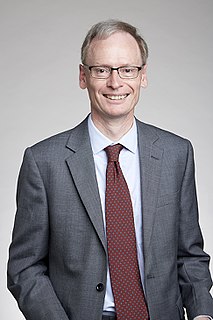Life
He was sixth son of Sir Thomas Dacres, knight, of Cheshunt, and was born in that parish, where he was baptised on 18 April 1624. He entered Magdalene College, Cambridge, in December 1642, and graduated B.A. in 1645. He was elected a fellow of his college on 22 July 1646, and took the degree of M.D. on 28 July 1654. [1]

Cheshunt is a town in the Borough of Broxbourne, Hertfordshire, lying entirely within the London Metropolitan Area and Greater London Urban Area. It is 12 miles (19 km) north of central London and has a population of around 52,000 according to the United Kingdom's 2001 Census.

Magdalene College is a constituent college of the University of Cambridge. The college was founded in 1428 as a Benedictine hostel, in time coming to be known as Buckingham College, before being refounded in 1542 as the College of St Mary Magdalene. Magdalene counted some of the greatest men in the realm among its benefactors, including Britain's premier noble the Duke of Norfolk, the Duke of Buckingham and Lord Chief Justice Christopher Wray. Thomas Audley, Lord Chancellor under Henry VIII, was responsible for the refoundation of the college and also established its motto—garde ta foy. Audley's successors in the Mastership and as benefactors of the College were, however, prone to dire ends; several benefactors were arraigned at various stages on charges of high treason and executed.
He settled in London and was elected a fellow of the College of Physicians on 26 June 1665, and assistant-physician to Sir John Micklethwaite at St. Bartholomew's Hospital on the resignation of Dr. Christopher Terne, 13 May 1653. On 20 May 1664 he was appointed professor of geometry at Gresham College, but only held office for ten months. He was censor at the College of Physicians in 1672, and died in September 1678, being still assistant-physician at St. Bartholomew's.

The Royal College of Physicians is a British professional body dedicated to improving the practice of medicine, chiefly through the accreditation of physicians by examination. Founded in 1518, it set the first international standard in the classification of diseases, and its library contains medical texts of great historical interest.
Christopher Terne M.D. (1620–1673) was an English physician.

Gresham College is an institution of higher learning located at Barnard's Inn Hall off Holborn in Central London, England. It does not enroll students and does not award any degrees. It was founded in 1597 under the will of Sir Thomas Gresham, and it hosts over 140 free public lectures every year. Since 2001, all lectures have also been made available online.








